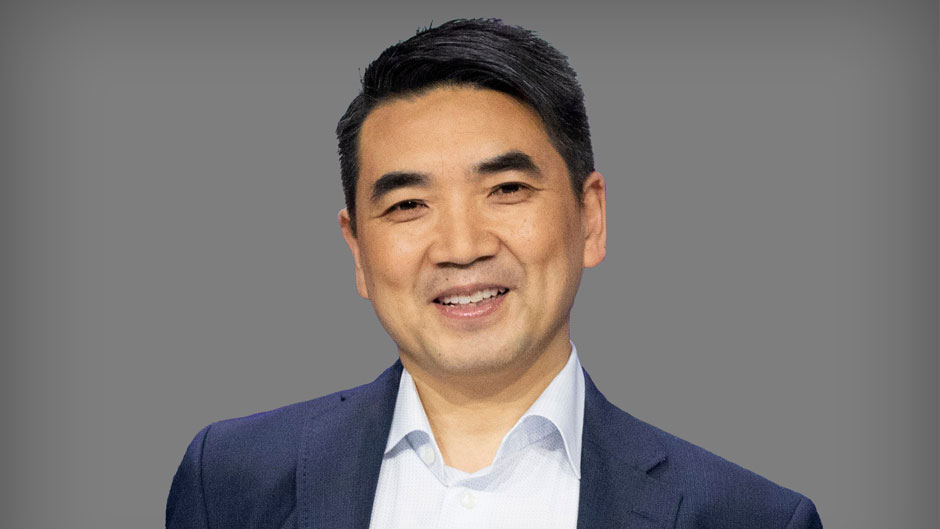Eric Yuan, who founded Zoom Video Communications in 2011, addressed attendees of the University of Miami Patti and Allan Herbert Business School Knight Venture Leaders Lecture Series earlier this week.
During the online event Tuesday, Yuan answered questions posed by Dean John Quelch and Ernie Fernandez, the University’s vice president for Information Technology and chief information officer, regarding Zoom’s evolvement as the preeminent videotelephony and online chat services platform and his own leadership development.
Born in China and the son of geology engineers, Yuan traveled to Japan in 1995 and there heard Bill Gates lecture about the future of the computer industry. The talk so inspired him that he vowed to move to Silicon Valley and join the tech boom.
He arrived in 1997 to pursue the “American Dream” and joined Webex, later acquired by Cisco, where he managed a large team of engineers. After several years though, he had become disillusioned by customer dissatisfaction and decided to go his own way.
“I realized the only way was to create a new solution—from the ground up,” Yuan said. He added that his motivation was stirred in large part by the question that had plagued him since he was a young boy: What brings happiness?
“I had no idea for a long, long time, but finally I had the epiphany that happiness comes from making others happy, whether it’s a community or society or your friends and family. When you think about others, you will be happy,” he said.
“That’s why when I started the company that was my priority. As a CEO, my number one job is not about the customer, product or service, it’s about our employees’ happiness,” Yuan added. “If I can make our employees happy, together we can make our customers happy.”
Yuan recognized that serendipity and media influence played a huge role in the firm’s launch and early success. Journalist Walter Mossberg reviewed the platform in The Wall Street Journal and recorded his own meeting with friends.
“We didn’t really have a launch strategy or any idea how to get across to one thousand or ten thousand users,” Yuan said. “But we were very, very lucky that a well-known journalist evaluated our services—I give all the credit to Walt.”
The positive article generated more than 50,000 users who became very loyal customers, according to Yuan.
Fernandez reminded Yuan that their communications began back in January, discussing business continuity for possible hurricane upheaval—not a global pandemic.
Yuan said Zoom has boomed over the past months because of its “very scalable architecture” and its “investment” in the company culture.
“We had so many new users—from schools to dance classes to juries to ‘Saturday Night Live’—and for several months we worked around the clock. And yet no one complained,” Yuan said. “We wanted to leverage this opportunity and do our part to be socially responsible and to help people stay connected.”
Yuan said the firm has depended on users’ feedback to improve its security and develop new features, such as the ability for musicians to play simultaneously and to minimize sound delays that compromise sound quality.
“We strive to keep the whole process transparent,” he said. “This is part of the reason that American companies do great because they keep everything open and transparent—we shared everything with our user community.”
What’s ahead for the firm?
According to Yuan, the firm is developing the potential for a shared interface with social media and also for embedding other apps within the Zoom interface that will allow users to operate like Uber drivers, managing payment and other facets of the system themselves.
Regardless of the duration of the pandemic, Yuan said Zoom will continue to offer free service to schools and nonprofits around the world.
“To care about the community where we live is very important—that’s the reason why every employee has to think about the bigger picture,” Yuan pointed out. “It’s not enough to think about your own company and service; we have to think about what can we do differently and how we can make a greater contribution to society.”
He admitted, though, that he underestimated the impact of the digital divide, the difference in opportunities afforded to those with access to new technologies and the internet and those who don’t have access.
“Even two years ago if you’d asked me about the divide, I’d have said ‘what, I don’t understand what you’re asking? But I was completely wrong,” Yuan said.
He highlighted the benefits of an initiative launched by the San Jose, Calif., mayor to address the divide.
“We should do more in other cities and states as well, and every business should think about what it can do to help with the divide,” Yuan noted. “It’s a much bigger and much more serious problem than we thought.”
Miami Herbert’s next Distinguished Leaders Lecture will feature Brian Moynihan, Chairman and CEO of Bank of America. For event registration information, click here.

